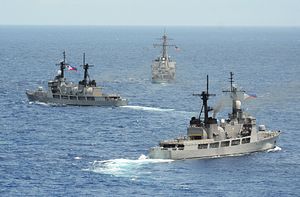“The physical contours of East Asia,” leading geopolitical analyst Robert Kaplan recently wrote, “argue for a naval century.” Given the significance of the maritime realm in the region – evident in everything from rich energy resources to vital maritime trade routes to raging territorial disputes in the East and South China Seas – few would disagree.
Despite this, as Ken Sato, president of the Institute for International Policy Studies (IIPS), observed last month at a symposium in Tokyo, East Asia still does not have a permanent organization or regional body to address maritime security issues. In his opening remarks to the Symposium on New Maritime Security Architecture in East Asia held at IIPS on January 30, he proposed the establishment of a new grouping tentatively named the Asia Maritime Organization for Security and Cooperation (AMOSC).
In the view of Sato and others, AMOSC’s central goal would be to prevent and manage existing maritime disputes between countries by enhancing domain awareness, improving capacity-building, and enacting confidence-building measures. Sato also said in his remarks that this would be a very timely proposal given Japan’s recent meetings with both China and the United States as well as the fact that 2015 marks the year of ASEAN-China maritime cooperation.
While the effort to mitigate maritime competition is a laudable one, those familiar with previous debates about regional institution-building will instantly recognize that such new proposals often also bring up some rather old and uncomfortable procedural, stylistic and substantive questions.
The first is whether institutions can really help manage such prickly territorial disputes at all. Chinese stonewalling on a code of conduct (CoC) with Southeast Asian states in the South China Sea – including recently trying to prevent the issue from even being discussed in existing multilateral fora – suggests that it is the absence of political will, rather than the lack of institutions, that is preventing the resolution of disputes. Given China’s cunning use of tactics to stall progress on these issues in existing institutions, it is unclear how a new one would help.
Even if one gets past this pessimism, the need for another new institution is at least a debatable proposition given the alphabet soup of regional organizations already in existence in the Asia-Pacific. Institutions like the ASEAN Regional Forum and the ASEAN Defense Ministers Meeting Plus (ADMM Plus) already do address the maritime security in some form. The newer Expanded ASEAN Maritime Forum, which includes the ten Southeast Asian countries plus Australia, China, India, Japan, New Zealand, South Korea, Russia and the United States, focuses on maritime issues more narrowly. Indeed, Asian diplomats dealing with these growing institutions have increasingly emphasized harmonizing them to avoid duplication.
The response might be that a fresh grouping is needed because the so-called ASEAN-led architecture, with the grouping’s preference for consensus, comfort, and its much-prized ‘centrality’, is too unwieldy, slow and weak to address these knotty issues as China’s stalling on the CoC has demonstrated. Even if there is some truth to that, it is hard to imagine how this would not be viewed as a slight or blow by many in ASEAN given the grouping’s fear of major power machinations and its role in presiding over a nascent Asian regionalism with incremental success in areas ranging from economic integration to military exercises via the ADMM Plus. This is not merely an existential concern. Southeast Asian participants at the symposium also referenced existing institutions and the need to preserve ASEAN centrality.
Lastly, as with other previous proposals like AMOSC, the devil is often in the details. For instance, as it stands, AMOSC’s focus on the specific question of solving or managing maritime disputes might make some countries – including potentially South China Sea claimants Malaysia and Brunei – rather uncomfortable because they tend to prefer addressing these issues as part of a broader conversation rather than in isolation to temper potential confrontation. If the membership looks too fishy or the agenda is not to its liking, China may dismiss it as a veiled attempt to contain it, thereby rendering the grouping rather irrelevant. AMOSC may also be better received if it is not marketed as being modeled on the Organization for Security and Cooperation in Europe (OSCE) as it is now, since that only amplifies fears within some states of major powers imposing external models on a region which has its own unique characteristics.
Since AMOSC is still a tentative idea, there may be ways to take these concerns into account and turn it into a reality. For example, one Southeast Asian participant noted that AMOSC might begin as an informal grouping first and gradually transition into a formal one over time much like the Pacific Economic Cooperation Conference eventually paved the way for the establishment of the official Asia Pacific Economic Cooperation process in 1989. There also could be some integration within the existing ASEAN framework, although as it stands right now that looks like it might take a bit of creativity.
The challenge, to put it bluntly, is that time and tide wait for no nation-state. While we debate the merits of new institutions, China, as I have argued previously, is actively changing the status quo on the ground in its favor, with its massive land reclamation efforts being only the most recent manifestation of a broader trend. More specifics about the proposal are supposedly due to be released in an upcoming report at the end of March. As of now, it remains to be seen whether AMOSC will sink or swim. But it is sure to rock the boat in an already turbulent Asia-Pacific.

































